

The Cloud CRM Market: Microsoft, Salesforce, SAP, Oracle and More. Posted November 2, 2011 By Drew RobbFeedback The cloud CRM market is a crowded one, so we offer an overview of the biggest names in our cloud CRM buying guide.
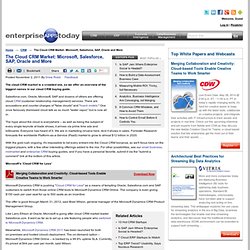
Salesforce.com, Oracle, Microsoft, SAP and dozens of others are offering cloud CRM (customer relationship management) services. There are accusations and counter-charges of "false clouds" and "roach motels. " One once famously dismissed cloud talk as so much "water vapor," but is now all in. The hype about the cloud is everywhere – as well as being the subject of every single keynote at trade shows, it arrives via prime time ads and billboards. With the gold rush ongoing, it's impossible to list every entrant into the Cloud CRM bonanza, so we'll focus here on the biggest players, with a few other interesting offerings added to the mix.
Cost Comparison Tool: Dynamics CRM Online vs Oracle CRM vs. SalesForce - CRM Software Blog - CRM Non. The trade off we have to grudgingly accept with the world is that you get what you pay for.
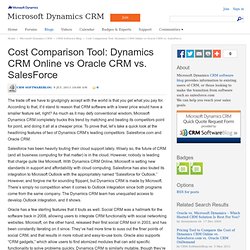
According to that, it’d stand to reason that CRM software with a lower price would have a smaller feature set, right? As much as it may defy conventional wisdom, Microsoft Dynamics CRM completely bucks this trend by matching and beating its competitors point for point, and doing it all at a cheaper price. To prove that, let’s take a quick look at the headlining features of two of Dynamics CRM’s leading competitors: Salesforce.com and Oracle CRM.
Salesforce has been heavily touting their cloud support lately. Wisely so, the future of CRM (and all business computing for that matter) is in the cloud. Oracle has a few sterling features that it touts as well. Cost Comparison Tool: Dynamics CRM Online vs Oracle CRM vs. SalesForce. 6inShare The trade off we have to grudgingly accept with the world is that you get what you pay for.
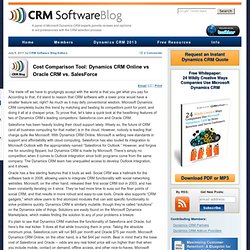
According to that, it’d stand to reason that CRM software with a lower price would have a smaller feature set, right? As much as it may defy conventional wisdom, Microsoft Dynamics CRM completely bucks this trend by matching and beating its competitors point for point, and doing it all at a cheaper price. To prove that, let’s take a quick look at the headlining features of two of Dynamics CRM’s leading competitors: Salesforce.com and Oracle CRM. Salesforce has been heavily touting their cloud support lately.
Oracle has a few sterling features that it touts as well. SalesForce.com Sales Cloud Enterprise Edition vs Oracle CRM ... Oracle vs. Microsoft Dynamics – Which Hosted CRM Solution Is Best For You? 1inShare In conjunction with their new pricing structure, Microsoft is currently offering 6 months of free subscriptions of Microsoft Dynamics CRM Online to any current Oracle CRM On Demand or Salesforce.com customer.
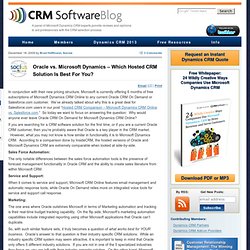
We’ve already talked about why this is a great deal for Salesforce.com users in our post “.” 3 Reasons Microsoft Dynamics® CRM Beats Oracle CRM. 3inShare Now that more organizations understand how will be critical to their success, many are looking for a good CRM system to improve sales, customer service, marketing, and other customer-related data.
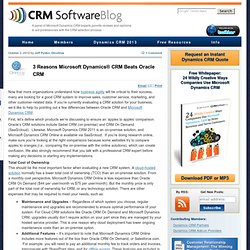
If you’re currently evaluating a CRM solution for your business, we’d like to help by pointing out a few differences between Oracle CRM and . First, let’s define which products we’re discussing to ensure an ‘apples to apples’ comparison. Oracle’s CRM solutions include Siebel CRM (on-premise) and CRM On Demand (SaaS/cloud). Likewise, Microsoft Dynamics CRM 2011 is an on-premise solution, and Microsoft Dynamics CRM Online is available via SaaS/cloud. Total Cost of OwnershipThis should be the most important factor when evaluating a new CRM system.
Maintenance and Upgrades – Regardless of which system you choose, regular maintenance and upgrades are recommended to ensure optimal performance of your system. On-Premise vs. Price Comparison. Office Fluent User Interface - The Ribbon in Microsoft Dynamics CRM 2011, like other Microsoft applications, is contextual. With each feature or form, it changes to show the most relevant information and commands. 99.9% Service Level Agreement SharePoint Sites Interoperability - Document management capabilities in Dynamics CRM are based on SharePoint. Users can take advantage of a wealth of document management capabilities including the ability to create custom content types, check-in/check-out capability, track changes, and version control. Complete Offline Solution – Whenever you go offline, you will have the same user experience and access to the same data. Presence Management Interoperability – View online status and send an instant message to any Microsoft Unified Communications or Live Messenger user, contact, or lead with a valid email address in Microsoft Dynamics CRM.
CRM 2011 - Driving Sales Productivity. Online CRM. Office 365 + Microsoft Dynamics CRM Microsoft Dynamics CRM alongside Office 365 empowers your teams to engage more effectively with your customers.
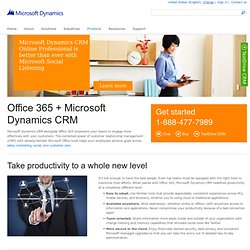
This combined power of customer relationship management (CRM) with already-familiar Microsoft Office tools helps your employees achieve goals across sales, marketing, social, and customer care. Get started1-888-477-7989 Take productivity to a whole new level It's not enough to have the best people. Easy to adopt. Take the next steps What is Microsoft Office 365? The Microsoft business productivity solution in the cloud offers secure business collaboration from anywhere, any time, and on virtually any device. Pricing & Editions - Sales Cloud - Salesforce.